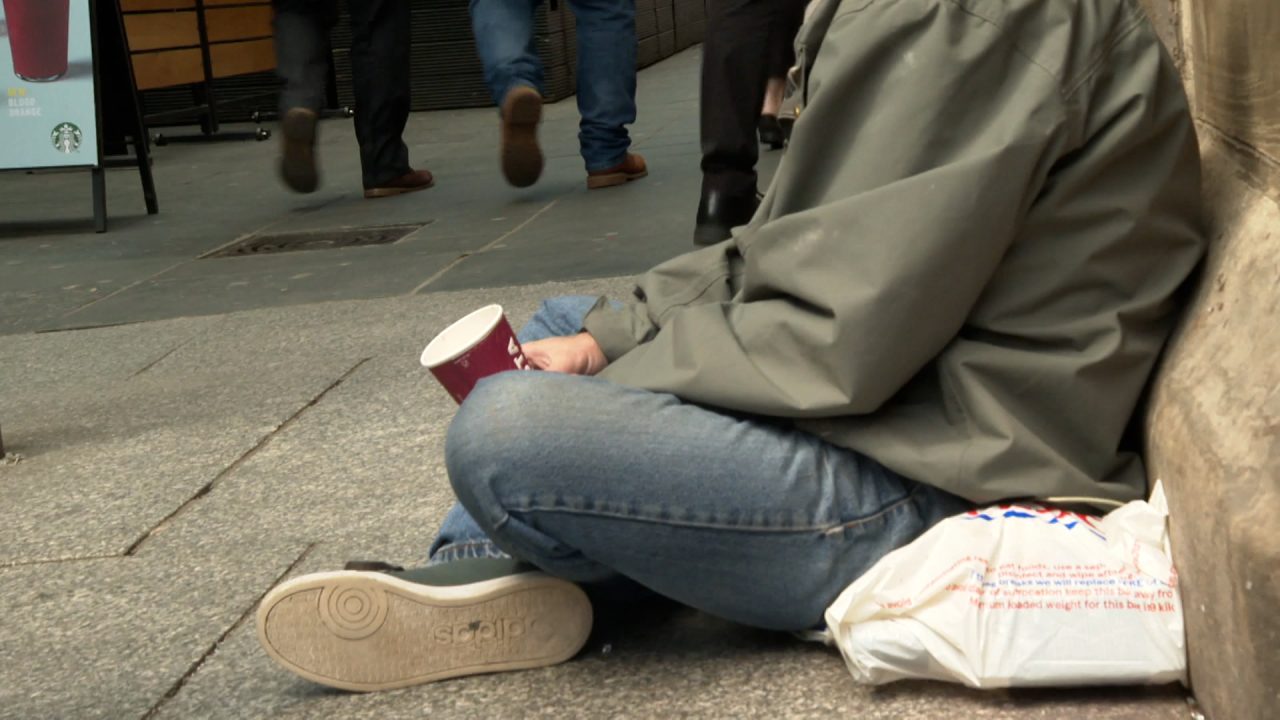Homelessness in Scotland has surged higher than pre-pandemic levels, according to official figures released on Tuesday.
In the statistics published by the Scottish Government, there were 39,006 applications for homelessness assistance between 2022 and 2023 – higher than pre-pandemic levels (37,053 in 2019-20).
The figures also show an increase of 3,247 (9%) when compared with 2021-22.
The data, compiled by Scotland’s chief statistician, shows there has also been a rise in the number of children in temporary accommodation, to 9,595 in March 2023 from 8,805 in March 2022.
There were 32,242 households assessed as homeless or threatened with homelessness across this period, which is also higher than pre-pandemic levels (31,618 in 2019-20).
There were 15,039 households in temporary accommodation on March 31 this year – a 6% increase when compared with 14,214 on March 31 last year.
The number of households becoming homeless from private-rented tenancy has dropped, in reaction to legislation changes.
Emergency Covid-19 legislation in 2020-2021 meant 11% of all homeless households fell under this category.
Since this was lifted in May 2021, numbers have been increasing, reaching 2,990 across the first six months of 2022-23 alone (19% of all homeless households).
However, the cost of living legislation introduced in October 2022 to protect renters resulted in a drop to 2,200 for the second six months of 2022-23 (13% of all homeless households).
An increase in rough sleeping has also been noted, with 2,438 households reporting rough sleeping during the previous three months and 1,500 the night before the application.
These remain lower than pre-pandemic and are the same proportions of all applications as the previous year (6% and 4% respectively).
Homelessness applications that closed in 2022-23 which used temporary accommodation spent 223 days in temporary accommodation on average. This increased from 214 days in 2021-22 and 175 days in 2017-18, when the time series started.
There were 445 instances of households not being offered temporary accommodation, with 420 concentrated in Edinburgh. This is a decrease of 38% compared to 2021-22.
Some 83% of households assessed as unintentionally homeless found settled accommodation in 2022-23, increasing from 82% in 2021-22.
The average length of time to close a homelessness case has been increasing over time and reached an average of 266 days in 2022-23. This compares to 262 days in 2021-22 and 226 in 2019-20.
Ewan Aitken, CEO of Edinburgh homelessness charity Cyrenians, said: “We are in the grip of a housing emergency in Scotland. That something so fundamental, something most of us take for granted – a safe and secure home – is out of reach and remaining out of reach for so many is an unconscionable reality made clear in today’s figures.
“As homelessness presentations continue to rise and the backlog in housing continues to build, we need to see urgent action from the Scottish Government and local authorities to end this crisis. That means substantial investment in social housing, land reform, and improving the supply of affordable homes which meet people’s basic needs.
“But housing alone isn’t enough – we need to address this as the public health crisis it is, and urgently invest in ways to tackle homelessness before it happens through early intervention, social support, community care, and ending poverty.
“The last child poverty figures published in this country back in March of this year told us that nearly a quarter of children in Scotland are living in poverty. We now know how many children and families are homeless. We can’t live with these figures.
Homelessness happens because of poverty and huge health inequalities, creating lasting impacts that echo through people’s lives. That so many people experiencing this is a tragedy – but it’s in our power as a nation to prevent. Every day charities like Cyrenians make a significant impact, but in order to stop these numbers continuing to rise, we have to see a collective commitment to sustainable prevention activity.
“In next week’s Programme for Government, the Scottish Government has the opportunity, by prioritising affordable housing, new and long term funded prevention duties, and social support, to turn the tide on this crisis. We hope these latest numbers force a commensurate response – we can’t turn our back on the human cost of the housing crisis.”
Assistant director of Shelter Scotland, Gordon MacRae, said: “These horrifying new figures add to the pile of mounting evidence that Scotland is in the grip of an unprecedented housing emergency.
“For decades social housing has been neglected and this is the result; more than 16,000 children in Scotland became homeless this year, many of them spending years stuck in miserable temporary accommodation.
“It is utterly shameful. We have some truly fantastic housing rights on paper, but the fact is they’re being breached as a matter of course across the country, because there simply aren’t enough social homes.
“There is no mystery surrounding the solution to this emergency, no need for more summits or round tables to puzzle out an answer. We need more social housing, and we need it now.
“The First Minister has repeatedly said that his mission in government is to end poverty, child poverty especially, in Scotland. There can be no hope whatsoever of achieving that aim unless he and his ministers commit to serious investment in delivering social homes.
“The 16,000 kids in Scotland who are having their childhoods robbed can’t wait a second longer for politicians to get their act together.”
Follow STV News on WhatsApp
Scan the QR code on your mobile device for all the latest news from around the country


 STV News
STV News
























